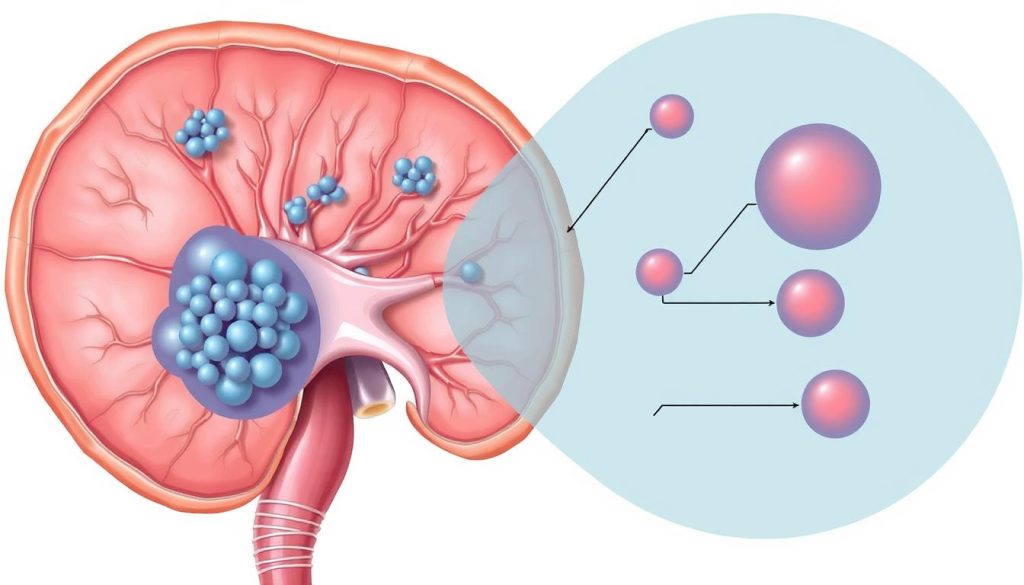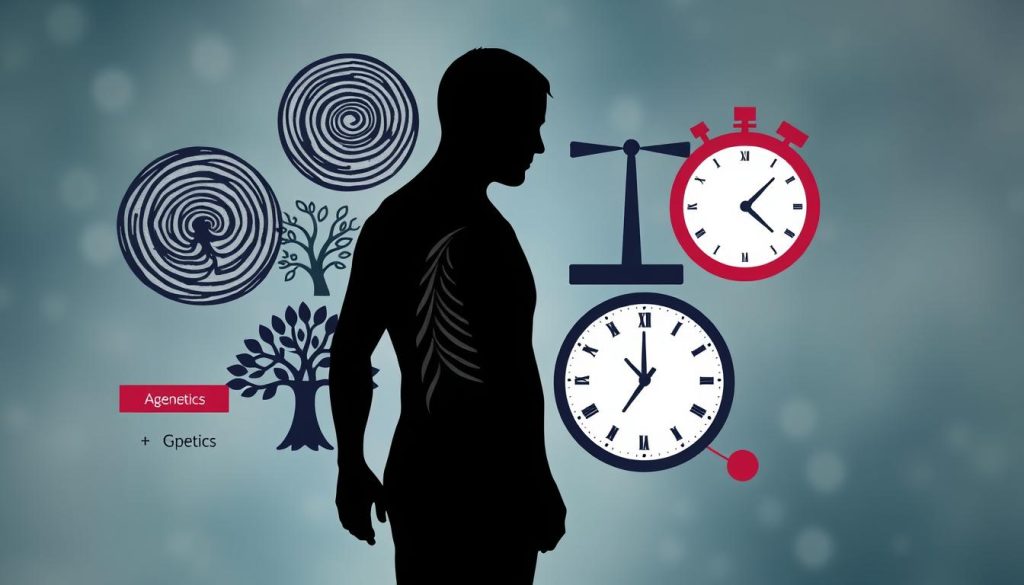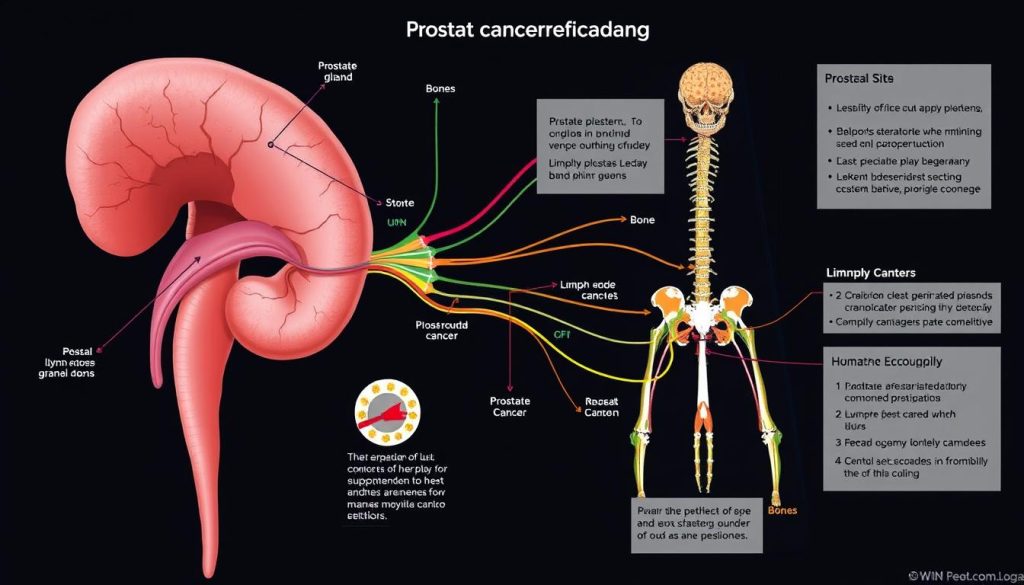Prostate cancer metastasis is a key topic for patients and their families. It happens when cancer cells leave the main tumor and move to other body parts. This change marks the disease’s move to a more serious stage.
Knowing how prostate cancer progresses helps patients choose the right treatments. As it gets worse, it can affect many organs and systems. Spotting metastasis early is crucial for effective management.
We will look into how prostate cancer spreads, where it often goes, and what affects its growth. This information helps patients and their caregivers work with doctors to find the best treatments.
Understanding How Does Prostate Cancer Spread
Prostate cancer metastasis is a complex process. It can lead to aggressive prostate cancer. To understand how this disease progresses, we need to explore the mechanisms behind its spread.
The Process of Cancer Cell Migration
Cancer cells break away from the primary tumor in the prostate. They enter the bloodstream or lymphatic system. Then, they travel to other parts of the body.
These rogue cells can settle in new locations. There, they form secondary tumors.
Common Pathways of Prostate Cancer Spread
Prostate cancer often spreads to specific areas. The most common sites include:
- Bones, especially the spine and pelvis
- Lymph nodes in the pelvic area
- Lungs and liver, though less frequently
Factors Influencing Metastatic Behavior
Several factors can affect how prostate cancer spreads:
- Gleason score: Higher scores indicate more aggressive cancer
- PSA levels: Rapidly rising levels may signal spread
- Stage at diagnosis: Later stages have a higher risk of metastasis
- Genetic mutations: Some gene changes can drive cancer spread
Understanding these factors helps doctors predict if prostate cancer will spread. They can then develop targeted treatment plans. Early detection and intervention are key in managing the disease’s progression.
Early Signs and Symptoms of Metastatic Prostate Cancer
It’s vital to spot the early signs of advanced prostate cancer early. This is because symptoms can show up and affect different parts of the body as the cancer spreads.
- Persistent bone pain, especially in the spine, hips, or ribs
- Unexplained weight loss
- Fatigue that doesn’t improve with rest
- Difficulty urinating or changes in urinary habits
- Blood in urine or semen
Remember, these symptoms can also be signs of other health issues. Regular health check-ups and talking openly with your doctor are key. They help keep an eye on how the cancer is progressing.
| Symptom | Possible Indication | Action |
|---|---|---|
| Bone pain | Potential bone metastasis | Consult doctor for imaging tests |
| Urinary changes | Local tumor growth | Discuss with urologist |
| Unexplained weight loss | Systemic effects of cancer | Seek medical evaluation |
Spotting these signs early can lead to quick treatment. This can slow down the cancer’s spread and improve life quality for those with advanced prostate cancer.
“Awareness of your body and any changes is key. Don’t hesitate to discuss new symptoms with your doctor, as early intervention can make a significant difference in managing advanced prostate cancer.”
Common Sites Where Prostate Cancer Spreads
Prostate cancer can spread when cells break away from the main tumor. These cells then travel to other parts of the body. This spread often happens to specific areas, which affects treatment and outcomes.
Bone Metastasis in Prostate Cancer
Bones are the most common place for prostate cancer to spread. The spine, pelvis, and ribs are often affected. This can lead to pain, fractures, and even spinal cord compression.
Lymph Node Involvement
When checking how far prostate cancer has spread, lymph nodes are key. Cancer cells can move through the lymphatic system. This can make treatment harder and change the outlook.
Spread to Vital Organs
In some cases, prostate cancer can reach vital organs. The lungs and liver are common sites. Less often, it can affect the brain or other organs.
| Metastasis Site | Frequency | Common Symptoms |
|---|---|---|
| Bones | 80% | Pain, fractures |
| Lymph Nodes | 10-20% | Swelling, discomfort |
| Lungs | 5-10% | Shortness of breath |
| Liver | 5-10% | Abdominal pain, jaundice |
Knowing where prostate cancer often spreads is key for managing it. Regular checks and scans help find metastases early. This guides treatment for those with advanced prostate cancer.
Stages of Prostate Cancer Progression
Understanding prostate tumor staging is key for both patients and doctors. It helps decide on treatments and predicts outcomes. Let’s look at the stages of prostate cancer progression.
Localized Prostate Cancer
This early stage means the cancer is only in the prostate gland. It grows slowly and might not cause symptoms. Treatment options include active surveillance, surgery, or radiation therapy. The prostate cancer prognosis at this stage is usually good.

Locally Advanced Disease
In this stage, cancer has spread beyond the prostate but not to distant parts of the body. It might affect nearby tissues or lymph nodes. Treatment often includes radiation and hormone therapy.
Metastatic Disease Classifications
Metastatic prostate cancer has spread to other parts of the body. It’s classified based on where it has spread and how widespread it is. Treatment options may include hormone therapy, chemotherapy, or newer targeted therapies.
| Stage | Description | 5-Year Survival Rate |
|---|---|---|
| Localized | Cancer confined to prostate | Nearly 100% |
| Locally Advanced | Spread to nearby tissues | About 90% |
| Metastatic | Spread to distant parts of body | About 30% |
Remember, these stages guide treatment, but each case is unique. Regular check-ups and open communication with your healthcare team are key to managing prostate cancer effectively.
Diagnostic Methods for Detecting Spread
Finding out if prostate cancer has spread is key to treating it well. Doctors use different tests to see if cancer has moved. These tests show how far the cancer has spread.
Imaging studies are very important. CT scans and MRIs give clear pictures of the body’s parts. Bone scans are crucial because cancer often goes to bones. PET scans can show where cancer is active in the body.
Blood tests are also vital. PSA levels can show if cancer is getting. If PSA goes up after treatment, it might mean cancer has spread. Other blood tests can also suggest cancer has moved.
Biopsies are the best way to confirm if cancer has spread. Doctors take tissue samples from possible cancer areas. Then, they look at these samples under a microscope.
| Diagnostic Method | Purpose | Frequency |
|---|---|---|
| CT/MRI Scans | Visualize organs and tissues | Every 3-6 months |
| Bone Scans | Detect bone metastases | Annually or as needed |
| PET Scans | Reveal cancer activity | As recommended |
| PSA Blood Tests | Monitor cancer progression | Every 3-6 months |
| Biopsies | Confirm metastasis | As needed |
Using these methods regularly helps track prostate cancer spread. Finding cancer early means doctors can adjust treatments. This can greatly improve the chances of beating advanced prostate cancer.
Risk Factors for Aggressive Prostate Cancer
Knowing the risk factors for aggressive prostate cancer is key for early detection and prevention. These factors can affect how fast the cancer grows and how well it can be treated. Let’s look at the main factors that might lead to a more serious form of this disease.
Genetic Predisposition
Some men are more likely to get aggressive prostate cancer because of their genes. Family history is a big factor in this risk. Men with relatives who had prostate cancer are more likely to get it too.
Environmental Factors
Environmental factors can also affect prostate cancer risk. Being exposed to certain chemicals or radiation can raise the risk of aggressive forms. Men working in industrial areas or with specific substances might be at higher risk.

Lifestyle Influences
Our daily habits can impact prostate cancer. Eating a lot of red meat and not enough fruits and veggies can increase risk. Not exercising and being overweight are also linked to more aggressive cancer. Smoking not only raises the risk of prostate cancer but also makes it more severe.
| Risk Factor | Impact on Prostate Cancer |
|---|---|
| Family History | Increases risk by 2-3 times |
| Obesity | 20% higher risk of aggressive cancer |
| Smoking | 24% increased risk of fatal prostate cancer |
By knowing these risk factors, men can take steps to lower their chance of aggressive prostate cancer. Regular check-ups, a healthy lifestyle, and knowing your family history are important. These steps can help manage prostate cancer risk.
Treatment Options for Metastatic Disease
When prostate cancer spreads, finding the right treatment is key. Advanced prostate cancer needs a custom plan to manage symptoms and improve life quality. Let’s explore some main ways to treat metastatic prostate cancer.
Hormone Therapy Approaches
Hormone therapy is often the first choice for metastatic prostate cancer. It lowers testosterone, which can slow cancer growth. Treatments include LHRH agonists or antiandrogens.
Chemotherapy Protocols
When hormone therapy stops working, chemotherapy might be suggested. This treatment kills cancer cells all over the body. Drugs like docetaxel and cabazitaxel are used in advanced cases. Chemotherapy can be hard, but it can help some patients.
Targeted Therapies
New targeted therapies offer hope for metastatic prostate cancer. They target specific changes in cancer cells. For example, PARP inhibitors target certain genetic mutations. Immunotherapy boosts the immune system’s fight against cancer. These treatments aim to extend life and improve quality of life for those with advanced prostate cancer.
FAQ
Q: How does prostate cancer spread?
A: Prostate cancer spreads when cancer cells break away from the main tumor. They travel through the bloodstream or lymphatic system to other parts of the body. This is called metastasis. Cancer cells usually go to nearby lymph nodes, bones, or vital organs.
Q: What are the early signs of metastatic prostate cancer?
A: Early signs include bone pain, unexplained weight loss, and fatigue. You might also have trouble urinating or see blood in your urine or semen. But, some men don’t show symptoms early on. That’s why regular check-ups are key.
Q: Where does prostate cancer commonly spread?
A: It often goes to the bones, like the spine, pelvis, and ribs. It can also spread to lymph nodes near the prostate. Less often, it goes to vital organs like the liver, lungs, or brain.
Q: What are the stages of prostate cancer progression?
A: There are three main stages: localized (stays in the prostate), locally advanced (spreads to nearby tissues), and metastatic (spreads to distant parts of the body). Each stage has more details based on how far it’s spread and the tumor’s characteristics.
Q: How is the spread of prostate cancer detected?
A: Doctors use imaging studies like bone scans, CT scans, and MRIs to detect it. Blood tests, like PSA levels, and biopsies help confirm the spread and how far it’s gone.
Q: What factors increase the risk of aggressive prostate cancer?
A: Genetic predisposition, age, and race (African American men are at higher risk) can increase risk. Lifestyle factors like diet and obesity also play a part. Environmental factors, like certain chemicals, may also affect it.
Q: What treatment options are available for metastatic prostate cancer?
A: Treatments include hormone therapy, chemotherapy, immunotherapy, and targeted therapies. The right treatment depends on how far it’s spread, your health, and the cancer cells’ characteristics.
Q: Can metastatic prostate cancer be cured?
A: Metastatic prostate cancer isn’t curable, but treatments can manage it. They can help control symptoms and extend life. Some patients live many years with the right treatment.
Q: How does hormone therapy work in treating metastatic prostate cancer?
A: Hormone therapy reduces male hormones in the body or blocks their effects. This slows down prostate cancer growth and spread. Many prostate cancer cells need androgens to grow.
Q: What is the prognosis for metastatic prostate cancer?
A: The prognosis varies based on how far it’s spread, your health, and treatment response. While serious, treatment advancements have improved outcomes. Many patients live several years after diagnosis.


















